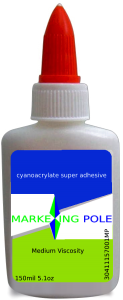cyanoacrylate

INTRODUCTION
Cyanoacrylate
Alkyl 2-cyanoacrylates or cyanoacrylates (CAs) are a family of vinyl monomers as strong fast-acting adhesives with industrial, medical, and household uses. The cyanoacrylate group in the monomer rapidly polymerizes by reacting to small traces of moisture on substrates’ surfaces. The abbreviation “CA” is commonly used for industrial grade cyanoacrylate.

Short chain CAs are methyl 2-cyanoacrylate (MCA), ethyl 2-cyanoacrylate (ECA) that have found great utility as the major components of industrial and household instant adhesives, commonly sold under trade names such as “Super Glue”. Long chain CAs are n-butyl cyanoacrylate (n-BCA), octyl cyanoacrylate, and 2-octyl cyanoacrylate that are used in medical, veterinary and first aid applications.
The high reactivity of CAs is attributed to the strong electron-withdrawing nitrile (CN) and ester (CO2R) groups attached to the α-carbon of the double bond. The β-carbon of CAs is activated towards nucleophiles, such as anions, as well as weak bases, water, and alcohols . In an adhesive context, polymerization or curing occurs through rapid initiation from the thin film of moisture commonly found on the surface of most materials. Commercial CAs will often contain radical inhibitors, such as hydroquinone, catechol, p-methoxyphenol, butylated hydroxyanisole, and related phenolic compounds to suppress radical polymerization.
if you have any question about product detail please
MARKETING POLE GROUP
Central Office TEL: 0098 5138407354
Email : info@marketingpole.com